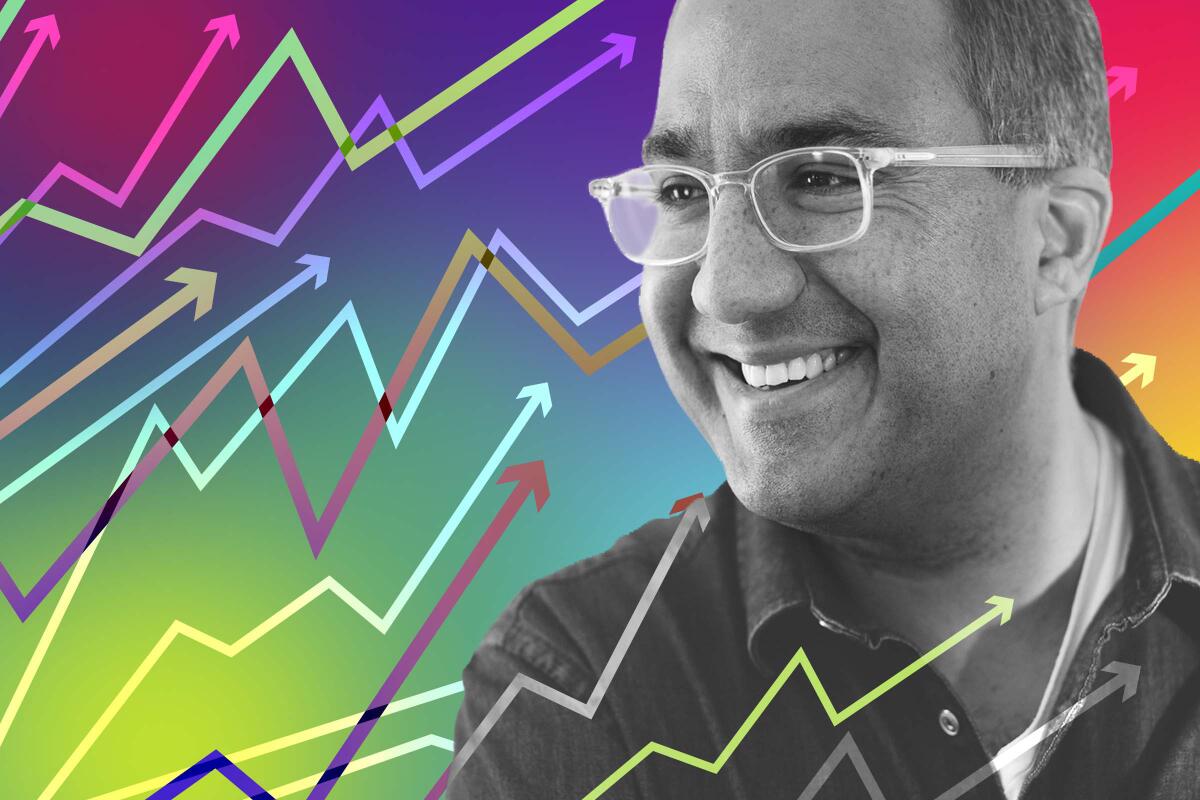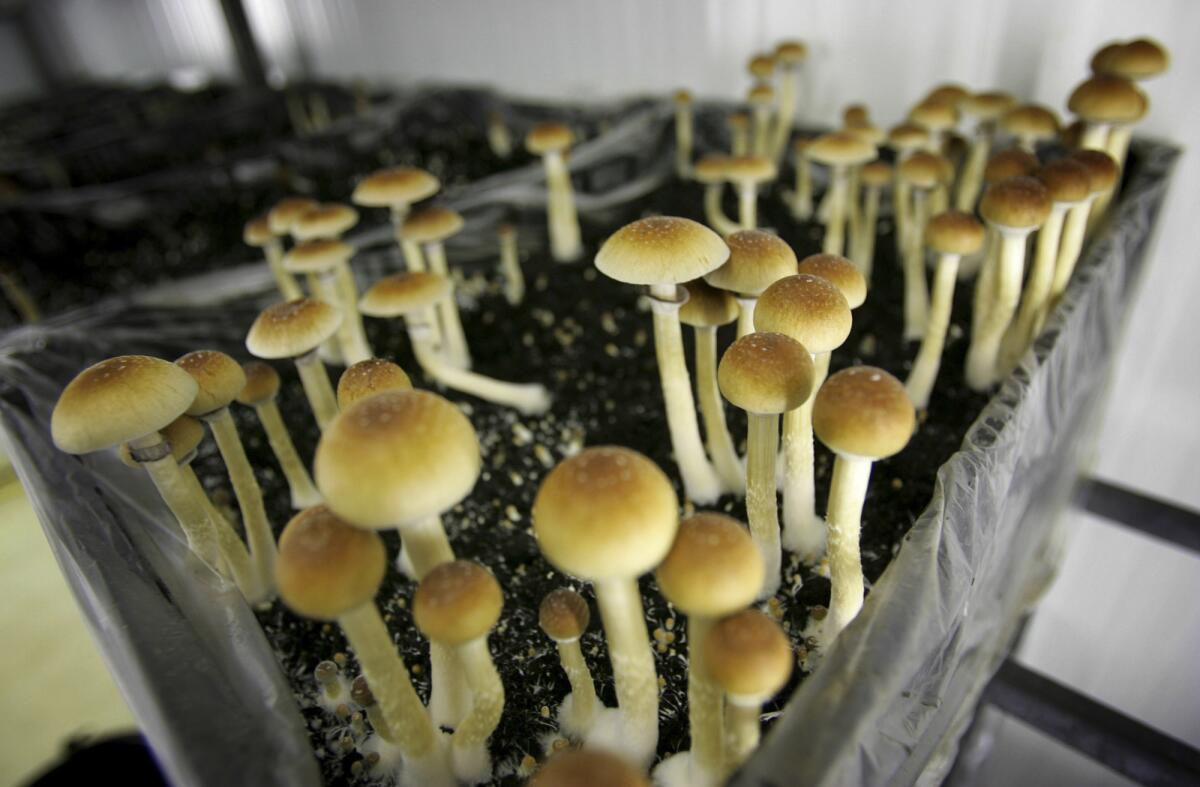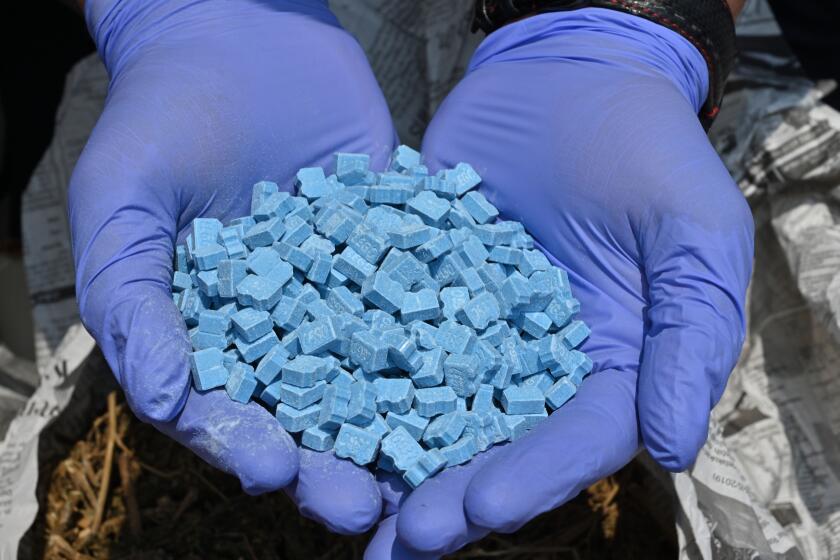Ayahuasca changed this hedge funder’s life. Now he’s bankrolling a psychedelic boom

- Share via
When Sa’ad Shah explains how he went from working in hedge funds to running the world’s largest psychedelic venture capital firm, he swings for the mythic.
“It’s a classic hero’s-journey type of story.”
For the record:
7:09 p.m. Oct. 1, 2021An earlier version of this article incorrectly stated that Sa’ad Shah was living in New York on Sept. 11, 2001. He was living in Toronto at the time.
It began with his study of esoteric traditions — Kabbalah, Sufism, Gnosticism, Rosicrucianism, hermetism, theosophy — while he was an economics major in college, followed by contemplation of quantum physics.
Then 9/11 happened. Shah had considered accepting a job at Lehman Bros.’ World Trade Center offices after college, before choosing to work in Toronto. Several industry colleagues died in the attacks. In the aftermath, Shah, who is of Pakistani, Turkish and Afghan descent, began to experience a new and startling racism in daily life. Even as he rose through the world of finance, he was troubled by the senselessness of man’s inhumanity to man. He dove deeper into the mystical, looking for answers.
Eight years later, working at a hedge fund in Toronto, he reached out to the author of a book on the metaphysical properties of ancient architecture, who invited Shah to an ayahuasca ceremony in Brazil. In a 16th century monastery tower atop a jungle hill overlooking the ocean, he drank the psychedelic brew and journeyed inward, where he confronted the faces of mortality and eternity, and returned a changed man.
“I was way more open, my fears and trepidations went away, and in a profound way I had a very brief glimpse of what it may be like on the other side of the veil,” Shah said. Back home in Toronto, people would ask him what had changed — a new diet? New haircut? New workout routine? — but for the time, he kept it secret. A reputation as a wild-eyed psychonaut does not inspire confidence when your job is managing other people’s money.
Or it didn’t used to. In the years since, a psychedelic renaissance has bloomed in the business world. Money has begun flowing into companies intending to monetize psychedelic therapy as new research has increasingly shown that blowing one’s mind can alter it for the better.
This scientific and commercial excitement rests on research showing that psychedelics can supercharge mental health treatment for PTSD, depression, anxiety, addiction and other chronic ailments of the mind, enabling patients to dive deep, confront their traumas and — a rarity for mental illnesses — return healed. That goes for synthetic chemicals such as MDMA and ketamine as well as plant-derived drugs such as psilocybin (the active ingredient in magic mushrooms), the South American plant brew ayahuasca, and ibogaine, a compound derived from the West African plant iboga.
Drugs like psilocybin, MDMA and LSD are proving effective for mental health. Healthcare providers need more and better information to share with patients.
More than two dozen psychedelic companies have gone public on Canadian stock exchanges, and a handful — MindMed, Compass Pathways, Atai Life Sciences and Field Trip Health — have gone public on the Nasdaq Stock Market in the last year. Collectively, they are now worth more than $4.5 billion.
Speaking at the Code Conference this week, Elon Musk summed up the tech industry’s prevailing attitude: “I think generally people should be open to psychedelics,” the Tesla and SpaceX chief executive said. “As the new generation gets into political power, I think we will see greater receptivity to the benefits of psychedelics.”
Dozens of investment firms have popped up to focus on the space, with hundreds of millions of dollars under management. Peter Thiel, Mets owner Steven Cohen and Tim Ferriss are among the wealthy individuals who have made big bets on psychedelic companies and donated to research.
But no group has a bigger stake in the future of psychedelic startups than Shah’s Noetic Fund.
In a profound way I had a very brief glimpse of what it may be like on the other side of the veil.
— Sa’ad Shah
For years after his first ayahuasca experience, he was careful whom he spoke with about his pharmacological explorations. Even within his family, it was controversial: “My wife was very concerned, and didn’t agree with it in any way.”
But by 2019, with approval of several drugs for therapeutic use seeming more promising, he decided it was time to break down the barrier between his psychedelic side and his professional life.
He had already opened up to some of his colleagues, who shared the counter-cyclical ethos of a hedge fund that zigs when the market zags. “Our whole objective was to seed new and esoteric strategies,” Shah said. The firm where he worked — Diversified Global Asset Management Corp. — got into oddball investments such as tail hedging (“We did very well in years like 2008, 2009,” Shah said), pharmaceutical royalties, weather derivatives and litigation financing (essentially investing in class-action suits), so mind-altering compounds weren’t such a stretch.
“Recognizing the telltale signs of a new and emerging industry or an asset class or a strategy in psychedelics was pretty easy,” Shah said. “We’ve seen this movie play out many times before.”
One of Shah’s partners at Noetic, Warren Wright, had been Shah’s psychedelic confidante for years. The two bonded as co-workers at DGAM, where Wright was assigned to be Shah’s mentor. On long flights to meet with investors, their conversations shifted from finance and politics to bigger questions.
“Before Sa’ad ever went into the jungle, we were avid readers together, and very curious about ancient civilizations and the practices they had, and obviously the medicines they used,” Wright said. But when Shah went to have his first ayahuasca experience, Wright stayed home.
“I lived vicariously through him,” Wright said. They spoke while Shah was in Brazil, and more when he returned to Canada, but Wright said he was too afraid — as a parent and fiduciary — to go himself.
Ten years later, in 2019, Wright’s marriage was falling apart. Shah told him, “you’ve got to read this book and go on this journey inward, rather than outward, because nothing outward is going to solve this,” Wright recalled. Shah gave him a reading list, and guided Wright through an MDMA experience himself, “to get me used to surrendering and opening my heart to the medicine.” Then he went to Rythmia, a major ayahuasca center in Costa Rica, and came back, like Shah before him, transformed.
“I often use the metaphor of a factory reset on your phone: It resets you,” Wright said. In February of 2020, they launched Noetic (“From the Greek noēsis/noētikos meaning inner wisdom, direct knowing, or subjective understanding,” according to the firm’s website) together with a third partner, Michael Franks, whom Wright had known for decades.
The firm is now the largest focused on psychedelics, with approximately $140 million in assets between its first fund and commitments for a second, with a goal of hitting $260 million by the end of this year. Noetic has also spun off Noetic Foundry, an incubator for psychedelic companies, and a media arm to promote the cause (and the business).
Shah’s goal is to scale the positive effects of psychedelics that he experienced firsthand to the whole world, accelerating its development the same way that venture capital has supercharged silicon, software and same-day delivery.
Or, as Shah puts it: “All we’re trying to do is raise the vibration within a small community, to a larger community, which can hopefully have ripple effects across the globe. And that can happen when people are functioning at their utmost, they’ve had their reset and they’re feeling good about themselves.”
That’s going to take a lot of cash. Shah estimates that with one molecule — MDMA — in the final Phase 3 of clinical trials and 18 to 20 more in Phase 2, it will take $30 billion to $40 billion in funding for all of those to make it through to approval.
Shah welcomes Big Pharma and big institutions to enter the fray in the interest of spreading the chemical gospel far and wide. He sees the financial and therapeutic potential for psychedelics not in the cannabis model, which would make psychedelics broadly available for retail purchase, but in the pharmaceutical mode — psychedelics as prescribed drugs, with patent rights, administered in medical settings.
“When you ask me, what is the holy grail here? I would be happy if one day in the not-so-distant future,” Shah said, “we can have discussions with our neighbors or friends or family members to say, oh by the way, I can’t make it to the barbecue party tomorrow, because I’ve got my sessions with a clinic to get my biannual reset.”
There’s a reason that an upstart fund like Noetic can claim the top spot in the industry. The product that most psychedelic companies hope to sell is, for the moment, very illegal. Even if a drug like MDMA or psilocybin does gain FDA approval for a specific protocol in the coming years, the Drug Enforcement Administration will still need to remove it from Schedule 1 under the Controlled Substances Act. States may decriminalize the compounds in the interim, but as with cannabis before it, operating in a gray area means regulatory risk.
Denver decriminalized magic mushrooms in 2019. Now advocates are pushing to legalize psilocybin — the active ingredient — as a treatment for various mental health problems.
The complicated chemistry of inventing and patenting new psychedelic molecules further muddies the waters, and the specter of outright scams — companies claiming to have a new, patent-protected psychedelic in the pipeline without much science to back them up — looms in the background. More established venture capital funds and larger players in the private equity and institutional investment world have largely stayed out of psychedelia to date.
In less than two years, Noetic has built a reputation as the elder statesman of the psychedelic investing community, in contrast to the treasure seekers who have piled into the space from the cannabis and crypto scenes in search of the next big moneymaker on the edge of legality.
Noetic is “considered to be one of the more buttoned-down institutions” in the fray, said Liana Gillooly, who works in fundraising and business development at the Multidisciplinary Assn. for Psychedelic Studies.
Much of the psychedelic startup froth relies on the pathbreaking work coming out of MAPS, which has been leading research on MDMA-assisted psychotherapy. In 2020, it raised $30 million to carry out the next phase of clinical trials necessary to seek FDA approval.
If its MDMA-assisted therapy finishes its clinical trials and gets FDA approval, as expected, in the next two years, MAPS will have sole manufacturing and distributing rights for medical MDMA for years, and it is exploring setting up its own network of clinics. But Shah has made a number of key investments in the field, Gillooly said, and is well-positioned to influence as well as profit from the next wave of authorized psychedelic companies coming down the FDA approval pipeline. (Psilocybin is close behind as a depression treatment.)
The investors in a typical venture capital fund — known as limited partners — are not publicly listed, and their identity is often considered a trade secret by the fund managers who cultivate relationships with limited partners over decades.
But Noetic’s partners agreed to speak with The Times out of a belief, shared with Shah, that being open about investing in psychedelics can help the world by removing the stigma — and help their investment by normalizing the business models of the companies they invest in. Dozens of individuals, organizations and family offices have bought into the two existing Noetic funds, including a number in Los Angeles.
Michael Makhinson, a psychiatrist at Harbor-UCLA Medical Center in Torrance, said that he began looking into psychedelic therapy “as a psychiatrist frustrated with the state of the field and current therapeutics.”
After years of seeing underwhelming results from existing psychiatric medication, Makhinson began reading the new psychedelic research “and found their effectiveness just undeniable.”
Introduced to Shah by colleagues, Makhinson liked that he was “favoring the FDA regulatory route over the Oregon route,” where state voters legalized psilocybin for broad medicinal use, and Shah’s approach of “not only planting capital, but influencing the direction of the field, of being central in the creation itself.”

“This field still has great barriers to overcome even among psychiatrists and psychologists,” Makhinson said. “I think most are still dismissive of psychedelics as potentially harmful and representing a hangover of a failed societal experiment in the 1960s.”
Jared Underwood found his way to Shah through the ayahuasca grapevine.
The Hollywood financier — he has produced films such as “John Wick” and “The Trial of the Chicago 7” through his company, Aperture Media Partners — had his own life-changing experience in the jungle some years back, and financed a 2019 documentary about the ayahuasca experience, “The Medicine.” One of the subjects of the documentary was already close with Shah: the mystical-history writer Graham Hancock was the man who first invited Shah to Brazil for his psychedelic experience in 2009.
Shah and Underwood bonded over their shared feeling of transformation. “It’s hard to explain to somebody without feeling like they’re quietly thinking that you’re nuts,” Underwood said. “But then once somebody else has experienced it, it’s sort of like you’re kindred spirits.”
“There’s nothing like having firsthand experience of the transformative powers of psychedelics to get you interested in it from an investment standpoint as well,” he added.
More than a decade into his journey into the psychedelic realms, Shah said he can see that awareness starting to spread more widely — even within his own home.
Over the last decade, Shah said, his wife had come to appreciate how psychedelic experiences had a positive effect on him, but still, “she didn’t condone it.” But in recent months, thanks to the flurry of promising research results published and the growth of the industry, she has started to come around.
“For her, this whole exercise of what happened with me in 2009,” Shah said, “now it all makes sense.”
More to Read
Inside the business of entertainment
The Wide Shot brings you news, analysis and insights on everything from streaming wars to production — and what it all means for the future.
You may occasionally receive promotional content from the Los Angeles Times.













